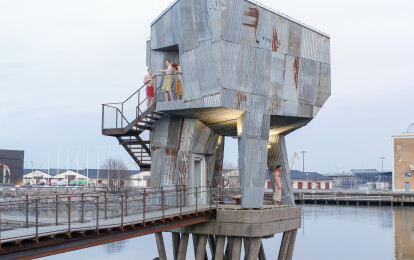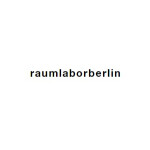EXPERIMENTAL ARCHITECTURAL PRACTICE
There was once a society that believed the future would bring better living conditions to everyone. There were people, utopian thinkers, who thought about the big questions of the city. Today only a feeling remains, half desire, half melancholy, reminiscing of those architects who wanted to live in a better society and who had dreamed of better places. Such an era is now over. Here begins my work.
raumlaborberlin is a network, a collective of 8 trained architects who have come together in a collaborative work-structure. We work at the intersection of architecture, city planning, art and urban intervention. We address in our work city and urban renewal as a process. We are attracted to difficult urban locations. Places torn between different systems, time periods or planning ideologies, that can not adapt. Places that are abandoned, left over or in transition that contains some relevance for the processes of urban transformations. These places are our experimentation sites. They offer untapped potential which we try to activate. This opens new perspectives for alternative usage patterns, collective ideals, urban diversity and difference.
For our projects, we form tailored teams of interdisciplinary experts. City residents are also specialists. No one knows better in each respective situation than those who have to deal with the places on a day to day basis. Thus we can gain valuable information about the history, fears, desires, existential needs, as well as deficits, that exists like an invisible network over every spatial situation. We forge active alliances between local actors and external experts. Thus we discover new areas of action and open new fields of experimentation, whose possibilities we test and examine collectively.
We call this “research-based design.” We are committed to dealing with places 1:1, discovering and using what we find within the conditions of the site. In the process of doing, we learn more through active design about the site of investigation and find new methods that are open to appropriation and upgrades the existing. We do not solve problems, rather we initiate processes that give actors the opportunity to know, understand and use the city and its dynamics, as well as its possibilities.
An architecture in which it is possible to merge space with individual experience can uncover new qualities and leads to new images of the city created in the minds of its users. New options and possibilities appear on the horizon of places or buildings, were nothing seemed possible before, because they appeared finally defined, were given up or simply forgotten.
Examples for this practice are projects like “Der Berg” (2005), a spacial installation in the former Palace of the Republic in Berlin; the “Eichbaumoper” (2009), an urban laboratory for the recapture of a neglected traffic junction in public space; “Moderato Cantabile” (2008), a festival centre in Graz or “Open House” (2010), a vertical village as a generator for an open society in South-Korea; “The KNOT” (2010), a laboratory for artistic production, dialogue and presentations in public space.
On an abstract level of city planning we have specialized in dynamic master planning. Activation through use is our central approach. Multi-facetted usage of public space a driving force for the development of vibrant, contemporary and adaptive neighborhoods. We try to invent new user-based applications and involve the urban actors as early as possible in the transformation processes.
City-planning projects are e.g. “Kolorado Neustadt” (2003-2006), scenarios for a new urban diversity in the shrinking city Halle-Neustadt, the “Rahmenplanung Dachauer Str.” in Munich (2009) or the “Aktivierende Stadtentwicklung Flughafen Tempelhof” in Berlin (2007-2008) and the collaboration for the concept of an “IBA Berlin 2020″ (2011).
raumlaborberlin also works in the field of urban interventions. We transform urban spaces into something completely different, far from all expectations and visions. We move programmatic narratives into urban spaces, install new atmospheres and create a sense of new potential. Through the participation of local actors in cooperation with experts from all creative disciplines, new fields of action are discovered, tested, and projected into the future.
Examples for this approach are the “Kitchenmonument” (since 2006), an ephemeral and interventionist object for the creation of temporary communities in Duisburg, Liverpool, Warschau, Munich, Berlin or Eindhoven; the “Hotel Neustadt” (2003) a theater festival in Halle/Saale; and again the “Eichbaumoper” (2009) a opulent opera in a run-down public space by the motorway A40 in between Mülheim and Essen.
Architecture is an experimental laboratory for a moment related to the participatory work practice in urban areas. Architecture is understood not as an object, but rather as history, a layer of the history of the place. As a








